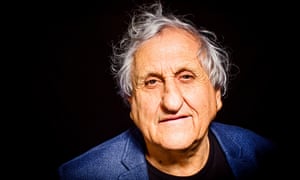
They are, if not the holy trinity, then at least the hallowed trio. Amos Oz,David Grossman and AB Yehoshua – once hailed as “the three tenors” of Israeli literature, who have for decades served an exalted double role. Inside the country, they are the unofficial liberal conscience of the nation: delivering rousing speeches at demonstrations or firing off newspaper polemics that burn with righteous indignation, whether lamenting Israel’s march rightward, denouncing its presence in the territories occupied since 1967 or making the deeply unfashionable case for peace with the Palestinians. Outside Israel, where literary prizes are heaped on them with unflagging regularity, they offer those same red-hot criticisms – but at the same time, and with no contradiction, also mount a defence of Israel itself: not its governments, but its right to be there and what they see as its enduring necessity.
Of the three, Yehoshua might be the least well known beyond Israel. Perhaps that’s because he does not have Oz or Grossman’s unnerving ability to deploy the English language with a precision and eloquence few native speakers can muster. Yet Yehoshua, who in his 80th year is the oldest of the trio, is at least as celebrated. In 2005, he was the sole Israeli on the shortlist for the first International Man Booker prize.
And yet recent times have not been good for the version of their country the trio have come to embody. Liberal, outward-looking Israel has been under sustained assault, taking its most overt form this year with a publicity campaign mounted by a rightwing activist group, Im Tirtzu, which named and shamed artists it branded “moles in culture”, slamming them for supporting leftwing organisations partially funded by foreign governments. On the hitlist were a variety of Israeli performers and singers, but pride of place went, naturally, to Oz, Grossman and Yehoshua. The Likud politician, Benny Begin – son of former prime minister Menachem Begin – condemned the campaign as “fascist”, while others warned that branding dissenting artists as, in effect, traitors was a tactic bound to end in violence against those targeted. When Im Tirtzu’s leader was accused of McCarthyism, his response was to defend Joe McCarthy.
But it goes broader than that. Yehoshua and his comrades have been on the losing side of Israel’s internal argument for more than 20 years. The “peace camp”, as it was always quaintly styled, has never recovered from the assassination in 1995 of Yitzhak Rabin, the prime minister who appeared to be on the brink of doing the peace deal they had all been advocating for decades. Since then, the “two-state solution” – which Oz and Yehoshua began to sketch out almost as soon as the 1967 war was over, and which imagines a secure Israel alongside an independent state of Palestine – has come to seem a fantasy, and a dead one at that. The cause of death, the Israeli peace camp would say, has been the intransigence of both the Israeli and Palestinian leaderships and Israel’s ever-expanding settlements on the West Bank. And as that two-state vision has withered, so has the movement – or the Israeli tribe – that once nurtured it. Where once the likes of Yehoshua could claim to speak for at least half of Israeli society, these days he seems to speak for an Israel – secular, enlightened, humane – that is shrinking, banished ever further to the margins.
No comments:
Post a Comment